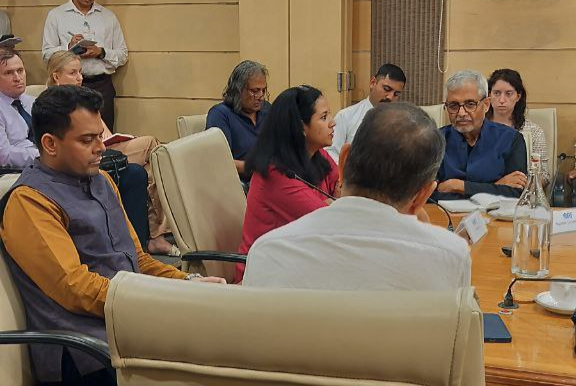IYESF at the ORF's Roundtable Discussion on Russia's Interest in the Indo-Pacific Region
- IYESF India Asfia
- Aug 9, 2024
- 2 min read

On 7th August, Wednesday, the Observer Research Foundation held a roundtable discussion on "Deciphering Russia's Interest in the Indo-Pacific Region" in New Delhi. The speakers for the discussion were - Ekaterina Koldunova, Associate Professor and Director, ASEAN Centre, Moscow State Institute for International Relations, Russian Federation; Vivek Mishra, fellow at ORF, India; Titli Basu, Associate Professor of Japanese Studies at Centre for East Asian Studies, JNU, India and Kirill Likhachev, Associate Professor at School of International Relations, Saint-Petersburg State University, Russian Federation. Mr Nandan Unnikrishnan, Distinguished Fellow at Observer Research Foundation, India, moderated the roundtable discussion.
Asfia Kulsoom, Project Associate for International and Regional Projects at IYESF, was in attendance at the discussion.

Vivek Mishra, in his presentation, made a point that since 2014, Russia has tried to pivot away from the Euro-Atlantic and tried to find ground in the Asia-Pacific. The persuasions for Russia are - the economic development of the Far East of its region, reviving the old soviet links, and forging new connections like with India, China and so forth. Regarding the institutional roadblocks for Russia in the Indo-Pacific he mentions the East-Asia Summit, the ASEAN region Forum and the Pacific Island Forum.
The next speaker Mr Kirill Likhachev, who joined the discussion online from Russia, talked about how the Indo-Pacific region has become strategically crucial for Russia's political and economic development facilitating increased involvement in this region from Moscow, so consequently, Russia's bilateral and multilateral relations with Indo-Pacific powers especially with India, China, Vietnam and others are gaining importance in analyzing Russia's current foreign policy priorities.
The last speaker for the forum, Dr Titli Basu, shared her observations on how Russia and some recent developments are impacting its neighbour, mostly north-east Asia. She also discussed how the dilemmas in domestic politics sometimes determine not just US elections but also the US allies.
The roundtable discussion was closed by the moderator after a Q&A session.

















Comments